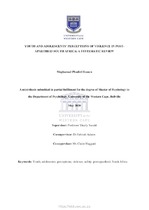Youth and adolescents' perception of violence in post-apartheid South Africa: A systematic review
Abstract
The history of South Africa is embedded in violence. This can be traced to the arrival of the Dutch settlers in 1652, to the Afrikaner–nationalist ideology of apartheid, and finally into the current dispensation of democracy. Historically, violence with its various forms and negative sequelae, has been narrated from an adult-centred perspective. Thus, due to the paucity of literature from the perspective of youth and adolescents, this study aims to review and synthesise the findings of existing empirical studies focusing on youth and adolescents’ perceptions of violence in post-apartheid South Africa. The study employed a systematic review methodology, which is a rigorous approach to reviewing the breadth and depth of literature on a particular topic, with specific criteria. After a systematic search of the literature, 34 articles were included in the review, with study samples including youth and adolescents aged 8 to 27-years. Three overarching themes were identified from the included studies, using thematic analysis, namely: exposure to violence; gender and sexual-based violence; and interpersonal and school violence. Findings demonstrate that the concept of violence is broad and nuanced, and that violence is experienced and enacted in multiple social settings. The key findings of the review are that several contributing factors result in violence, which includes but is not limited to the consequences of apartheid, low socioeconomic conditions, hegemonic masculinity, and male entitlement over women. At a grassroots level, more research is needed to gain deeper knowledge about how youth and adolescents understand, conceptualise, and contextualise the differing constructs of violence through various frameworks. Violence prevention and intervention requires a collaborative approach to exact meaningful change that will be beneficial for all stakeholders.

